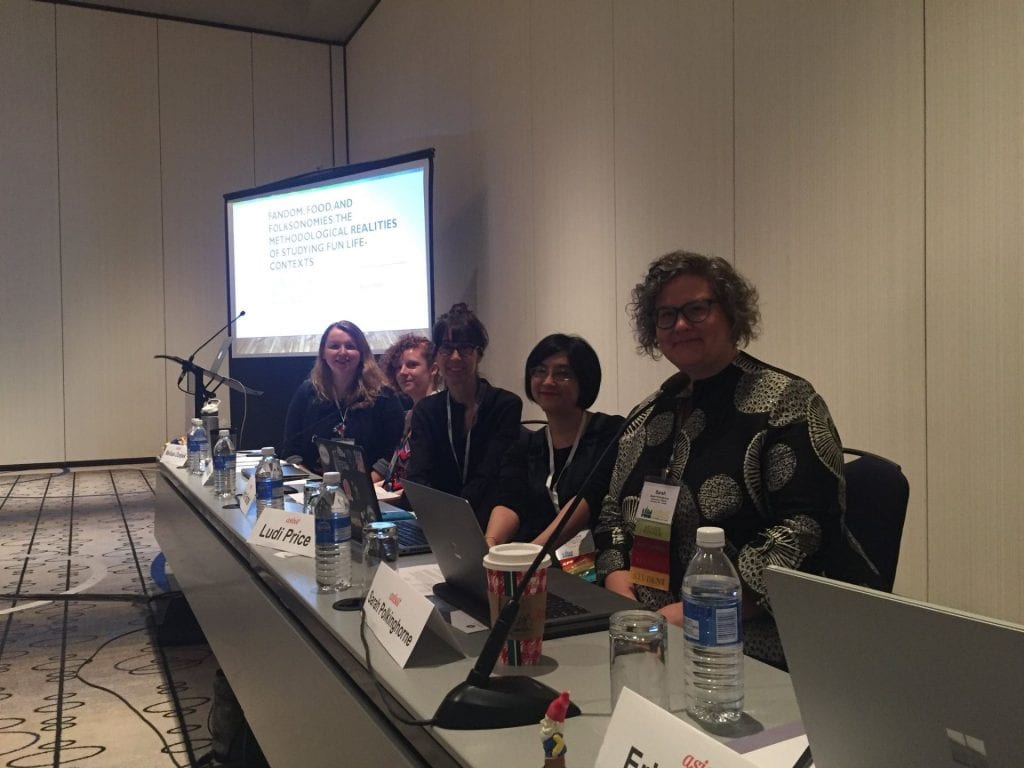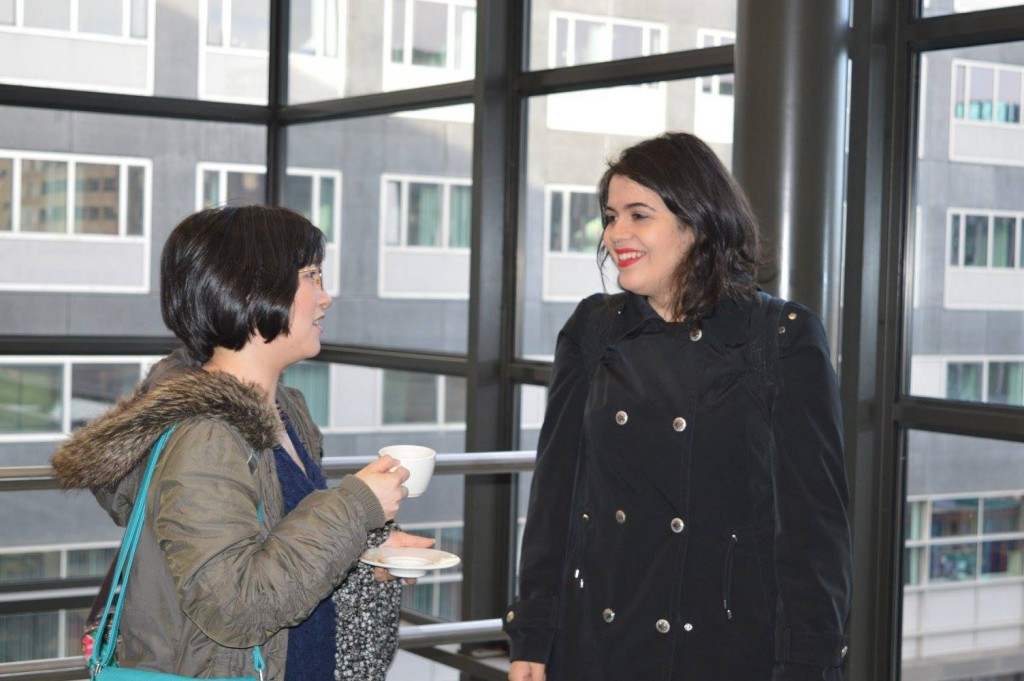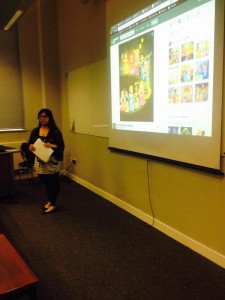
The Fandom, Food and Folksonomies panel at ASIS&T 2018 (courtesy of Eric Forcier).
Earlier this month, I was in Vancouver for the 2018 Annual ASIS&T meeting, to give a panel with some of my peers on research methodologies in fun-life contexts. The title of the panel was Fandom, Food and Folksonomies: The Methodological Realities of Studying Fun Life-Contexts – the conference proceedings can be viewed here. I was joined by the panel organiser, Melissa Ocepek, Julia Bullard, Sarah Polkinghorne, and Eric Forcier; the panel was moderated by the wonderful Jenna Hartel, whose work into Serious Leisure information behaviour has been a standard and inspiration for many of us working in the field.
The focus of my part of the panel was on research ethics, particularly interdisciplinary research ethics. As Carlin (2003) has noted, while LIS is a “net importer of research strategies […and] it could be assumed that research ethics would have been adopted, or formed the basis for debate” (Carlin 2003, p.5), there is still no overarching framework for interdisciplinary research ethics within LIS. In the particular case of my doctoral research (Price 2017), looking outside of LIS for an ethics framework was important, as the subject of my research (fan practice) has traditionally been, and to some extent still is today, considered deviant. Some fanworks/fan practices can be sexually explicit, or otherwise ‘pathological’, and therefore exposure can be damaging to fans. In addition to this, fanworks often exist in a legally grey area copyright-wise, which can expose fans to legal repercussions. As Busse and Hellekson (2012) have noted, fans share their work in ‘semi-private’ or ‘semi-public’ spaces, where they do not expect them to be scrutinised by outsiders, let alone academics. It is partially for this reason that fans may publish their work pseudonymously, in order to protect their identities.
For this reason, in my research I adopted the TWC’s ‘fans first’ framework, which protects fans’ rights to privacy despite their work being developed and published in semi-public spaces. This might not strictly satisfy academic standards with regards to, for example, citations (‘fans first’ does not promote using URL’s to identify the location of fanworks); but it does give fans a token layer of the expected privacy from non-fandom publics. From an academic perspective, the location would still be identifiable by those seeking to verify the information given by using modern online search methods.

The Fandom, Food and Folksonomies panel at ASIS&T 2018 (courtesy of Eric Forcier).
The point of my presentation was to make LIS scholars aware that, when researching fun-life contexts, the groups subject to that research may follow cultural norms that are particularly sensitive and should warrant special consideration. This may be the case in, for example, a study of the information behaviour of BDSM practitioners, queer communities, or of dark web usage. In these cases, there may already be an extensive body of literature in other disciplines that explore the ethics of researching such groups, and it would behove the LIS scholar to acquaint themselves in such literature before undertaking their research. This should allow for a more holistic and sensitive approach to engaging with communities that might be wary of or even hostile to academic enquiries into their (sub)-culture.
The panel itself was a success, not in the least due to the fantastic moderation of Jenna Hartel, the fascinating research presented by my co-panellists, and the discerning questions from the floor. Despite the panel taking place at 8:30am, there was a large audience, and after the panel we were all swamped by attendees interested in our work, which was hugely gratifying.
Afterwards there was plenty left of the day. After a short break I next wandered into the ‘Meet the Editors’ panel, and was interested to hear from Samuel Kai Wah Chu (incoming editor of the journal Information and Learning Science) about the importance of interdisciplinarity to his journal. His focus was on how information science and learning science intersects, and how we can bring scholars from other fields together. My opinion is that, since information permeates and impacts all our lives, information science is, necessarily, multi- or interdisciplinary. What it isn’t so good at is communicating to other disciplines with which its research overlaps, and so I was glad to hear that other scholars in the field are taking this question seriously.
I next went to the Knowledge and Information Organisation track. The first paper, delivered by Oksana Zavalina, presented research on the implementation of RDA standards in libraries worldwide, and over time, which I found particularly interesting, as my place of work is currently implementing RDA, or at least the bare minimum of the standard. Due to a lack of man-hours, we are unable to retroactively update old records, although we are doing so in an ad hoc and piecemeal manner – so it will indeed be interesting to the results of RDA uptake in a longitudinal study.
The second paper, Reconceptualizing Superwork for improved access of popular cultural objects, was of particular interest to me, as, of course, the organisation of fanworks (a type of popular cultural object) is a subject close to my heart. The presentation, delivered by Jacob Jett, was excellent, and gave much food for thought. Fanworks were not included as objects in the superwork hierarchy per se, although there was discussion of if and how they should fit in, and the authors indicated that they would be considering fanworks in future research. Julia Bullard and myself had an interesting back channel conversation about it on Twitter during the presentation (see below for the thread). My opinion is that fanworks are intrinsically tied to the superwork (or source text(s)), and would certainly appear in a hierarchical model under the superwork. The Archive of Our Own’s classification system, also hierarchical, is an excellent example of how fanworks relate to a superwork (see their Gundam page for an example).
The final keynote, delivered by Zeynep Tufekci, was a fantastic end to the day, and very topical considering the ‘post-truth’ age we now live in. Zeynep’s talk focused on how we have evolved from information censorship to information ‘distraction’ – our current state of information glut is an effective way of distracting from ‘inconvenient’ information that the powers that be do not want us to see. Fake news and click bait has proved to be a far more effective and insidious form of censorship than censorship itself. The talk was inspiring and very pertinent to the responsibility we, as information professionals and scholars, bear in current times.
All in all, I had a fantastic time at ASIS&T, not only for the stimulating and inspiring content, but also for the fantastic people I talked to and shared research with. This was a great opportunity to connect with the wider LIS community, both intellectually and personally.

ASIS&T 2018 – achieving full rainbow!
REFERENCES
- Busse, K., and Hellekson, K. (2012). Identity, ethics and fan privacy. In: K. Larsen and L. Zubernis (eds.). Fan Culture: Theory/Practice. Newcastle upon Tyne: Cambridge Scholars Publishing, pp. 38-56.
- Carlin, A. P. (2003). Disciplinary debates and bases of interdisciplinary studies: the place of research ethics in library and information science. Library & Information Science Research, [online] 25, 3-18. Available at: http://dx.doi.org/10.1016/S0740-8188(02)00163-9.
- Price, L. (2017) Serious leisure in the digital world: exploring the information behaviour of fan communities. [pdf] Ph.D. City, University of London. Available at: http://openaccess.city.ac.uk/19090/







